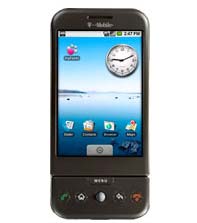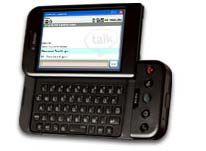 So the infamous Google Phone aka gPhone is finally out. The big news is that it is the first to run Android, which I shared my thoughts on a few months ago. Now that the press has been all over it, here are my observations:
So the infamous Google Phone aka gPhone is finally out. The big news is that it is the first to run Android, which I shared my thoughts on a few months ago. Now that the press has been all over it, here are my observations:
App Store
The fact that there is no company (yet) restricting what you can install on it is awesome. Apple has seriously dropped the ball in this regard. I’m still thinking Apple will eventually loosen up just like the original “no applications” stance. I’m also thinking T-Mobile, if not other providers will want to clamp down on what users install to ensure nothing competes with their offerings and eats too much bandwidth. Not to mention security, or “security” depending on how you look at it. Just wait. They already block VoIP. It will expand in time.
The Network / Bandwidth Cap
T-Mobile’s 3G network is enough of a reason to say no. It’s way to small and new. Likely because of this, they snuck a little clause in the terms (via dslreports.com) limiting you to 1GB of 3G data, then essentially crippling the service for the remainder of the billing period:
If your total data usage in any billing cycle is more than 1GB, your data throughput for the remainder of that cycle may be reduced to 50 kbps or less. Your data session, plan, or service may be suspended, terminated, or restricted for significant roaming or if you use your service in a way that interferes with our network or ability to provide quality service to other users
Software
Android is Linux. I love Linux. That said, love polished software most of all, and I love the UNIX-ness of Linux most about Linux. That said, the iPhone’s UI is way more polished even in the demos, which we all know are way better than reality. That said, iPhone OS is at 2.1 now and Android is just taking off. There’s time for future polish.
Another gripe is the attachment to Google services. What happened to “do no evil”? Google released Chrome which kept your default search engine (even if it was a competitor). The phone on the other hand requires a Google account. Lack of Exchange support isn’t a great thing. I bet this is because of it’s open source nature. Apple simply licensed ActiveSync from Microsoft. I’m not sure if Google could do this for Android itself (though an application running on Android potentially could). The licensing could be tricky. Push mail for Gmail is a nice touch though.
Hardware
 Having a keyboard is nice. Totally not worth the size though. USB adapter for a headphone jack? It’s 2008, that’s not acceptable. No multitouch? Come on. It does have a Qualcomm MSM7201A which is a 528 MHz ARM9 chip from what I understand. Not sure if it’s underclocked or not. The iPhone has a 620 MHz ARM11 underclocked to 412 MHz. It has 192 MB RAM compared to the iPhone’s 128 MB and a 3.1MP camera, compared to the iPhone’s 2MP. Using an SD card for storage is a mixed blessing. One one side you have expandable storage (awesome). On the other hand, no built in storage (suck). You’ll need to buy a card if you want more than 1 GB, meaning most of the hardware cost savings between it and the iPhone will be gone.
Having a keyboard is nice. Totally not worth the size though. USB adapter for a headphone jack? It’s 2008, that’s not acceptable. No multitouch? Come on. It does have a Qualcomm MSM7201A which is a 528 MHz ARM9 chip from what I understand. Not sure if it’s underclocked or not. The iPhone has a 620 MHz ARM11 underclocked to 412 MHz. It has 192 MB RAM compared to the iPhone’s 128 MB and a 3.1MP camera, compared to the iPhone’s 2MP. Using an SD card for storage is a mixed blessing. One one side you have expandable storage (awesome). On the other hand, no built in storage (suck). You’ll need to buy a card if you want more than 1 GB, meaning most of the hardware cost savings between it and the iPhone will be gone.
From a size perspective, it’s slightly larger in most ways and heavier. That’s likely mostly due to the keyboard.
Gizmodo has a great hands-on discussing their initial impressions. Pretty much matched my feelings from seeing the demos, and having played with the Android emulator.
So far the iPhone is still the clear winner, but it’s only one phone on the the Android platform thus far. It’s not a threat yet, but it’s not eliminated either.